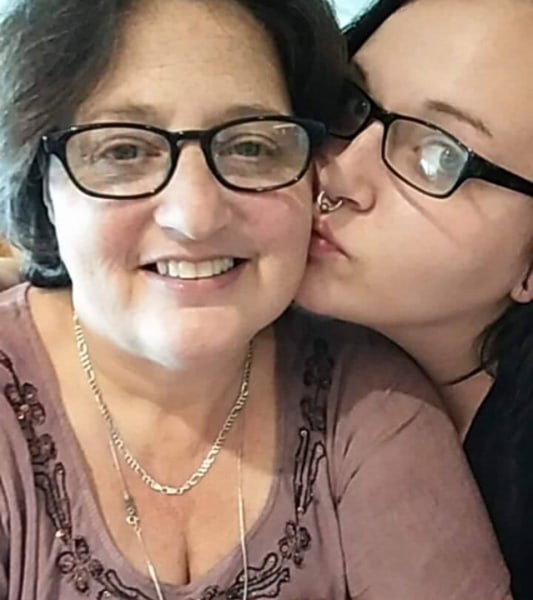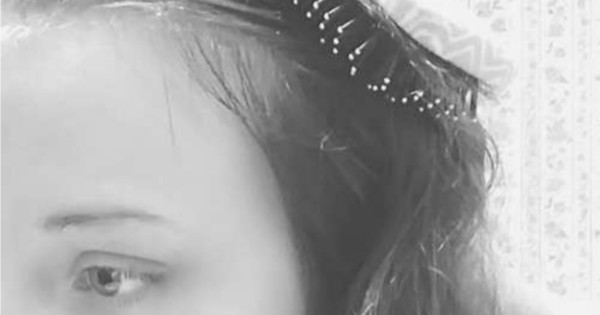After a month of crippling depression, Katelyn Marie Todd started feeling better and realized she needed to tame her knotty, dirty hair. After the teenager finished, she felt particularly proud of herself so Todd — who has struggled with major depressive disorder over the past seven years — shared her experience on Facebook.
“I brushed my hair today. For the first time in 4 weeks. It was matted and twisted together. It snapped and tore with every stroke. I cried while I washed and conditioned it, because I forgot how it felt to run my fingers through it,” she wrote.
The post has been shared almost 300,000 times and Todd, 17, thinks it’s “wild.” But the Georgia teen is glad that by sharing her vulnerabilities she has inspired others.
“I had thousands of comments saying my post helped them in some way and it feels really amazing,” she told TODAY. “The most important thing that I got from the whole experience was the idea that I was not alone.”
Dr. Ken Duckworth says he’s not surprised that so many people responded positively to Todd’s message because it illustrates what depression can be like.
“She breaks it down to very human terms … her experience is powerful,” said the medical director of the National Alliance on Mental Illness. “I am hoping it will shed a little light on depression.”
Depression remains one of the most common mental illnesses; experts believe that 17 percent of people will experience in their lives. The National Institute of Mental of Health estimates that 6.7 U.S. adults experienced one major depressive episode in the past year.

Katelyn Marie Todd’s post about her life with depression has gone viral and she feels glad her experiences have helped other.
“We have all either experienced major depression or love or care about someone who has. It is more common than we think,” said Dr. Pierre Azzam, psychiatrist at Western Psychiatric Institute and Clinic of UPMC. “We all experience sadness … but usually when we are talking about depression medically we are talking about major depressive disorder.”
Major depressive disorder certainly differs from that occasional blue mood. People with depression have compromised functioning and at least two weeks of experiencing five of nine symptoms, including:
- Changes in appetite
- Loss of interest in once-enjoyable things
- Changes in sleep
- Sad, hopeless feelings
- Loss of energy
- Feelings of worthlessness or guilt
- Inability to concentrate
- Thoughts of death or suicide
- Feelings of extreme restlessness or fatigue
Despite how common depression is, people often avoid seeking help, thinking it might get better in time. But experts urge people to visit a doctor if they suspect they have it.
“Very often people think depression is a moral weakness but it is a biological disorder that can be treated,” said Dr. Lilian Gonsalves, psychiatrist at the Cleveland Clinic. “Eighty percent of the time depression is a treatable illness.”
Treatment often includes a combination of medication and psychotherapy along with healthy habits, including regular sleep, a good diet, exercise, and socializing regularly. This last part can be tricky because as Todd indicated, depression causes people to push away others.
 Courtesy of Katelyn Marie Todd
Courtesy of Katelyn Marie Todd
Some people criticized Katelyn Marie Todd for not looking depressed all the time. She hopes people learn from her experience that depression doesn’t have a look.
“Depression is having 3 friends that are only still around because they have the patience and love of a saint,” Todd wrote. “Depression is making your family cry because they think you don’t love them anymore when you’re distant and distracted.”
Duckworth is unsure whether sharing on social media helps people working through mental health problems, but he knows that when people share their feelings, they feel more connected.
“Silence and shame are two key problems in addressing mental health problems,” he told TODAY.
At the end of the post, Todd urges people to “please be easy on your friends and family that have trouble,” which is one of the most important ideas she wanted to share. Being isolated made it much harder for her.
“For years, I felt like I had no one to talk to,” she told TODAY. “I still couldn’t convey it quite perfectly so no one really got the full idea of what I was feeling and it was really lonely. And I don’t want anyone else to feel lonely like that.”
Therapy 121 exists as a resource for those who need some one to talk to. If you feel that you need support or just need to talk to.
Contact us at Therapy 121, YOU ARE NOT ALONE.
Source: TODAY







